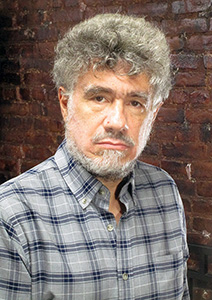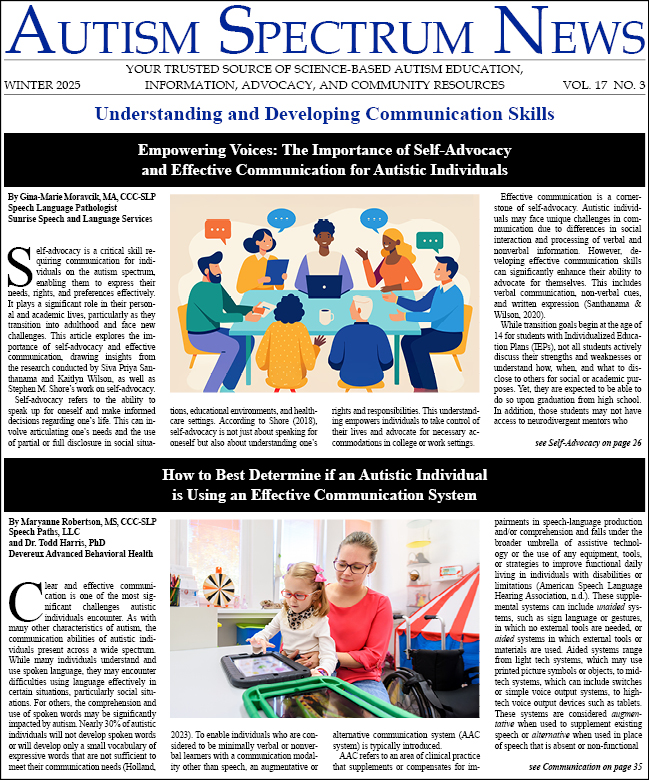It has been a long time since I was a student. In fact, it would be many years before most people would even have heard the word autism, and decades before I was finally diagnosed on the spectrum. As such, I never received any supports or accommodations. Fortunately, I managed to succeed academically to the point where I was able to have a professional career. What most people don’t realize, however, is that were it not for an incredible amount of luck, my story may well have ended quite differently. As such, I am writing about supports and accommodations for ASD students mainly from the standpoint of things that would have benefited me had they been available all those years ago. I also consider many stories that I have heard over the years of my involvement with the ASD community.

Karl Wittig, P.E., Advisory Board Chair
Although many on the autism spectrum will certainly need intensive interventions and full-time support services, which can be very expensive, the lives of many more ASD students can be greatly improved simply by increasing awareness of the challenges they face on the part of teachers, administrators, and other education professionals, and by providing accommodations to these students that mitigate their challenges. This can be done at virtually no cost to either families or taxpayers simply by changing some long-standing attitudes, beliefs, ideas, and practices.
One such attitude is the belief that things like social skills and daily living skills do not need to be taught in schools. This notion is based on the erroneous idea that everybody is able to “pick up” these skills instinctively and as such do not require their explicit instruction. I recently attended a presentation on research which revealed that, even though IQ and daily living skills are positively correlated in typical populations, the latter are nearly independent of the former in autistics. More than 10 years ago, at a high-functioning autism conference, I learned that such instruction was only provided to students with intellectual disabilities (as determined by IQ). Over the years, I have heard many family members and education professionals describe their exasperation with a young person on the spectrum who has considerable difficulty with very basic things even as they have extraordinary talents in other areas; this applies not only to “twice-exceptional” students of high academic ability, but to all those who have any of the “splinter skills” that are common among autistics (such as extensive, detailed knowledge about an area of specialized interest). They cannot understand why these otherwise-gifted individuals are so challenged by things that the vast majority of the population is able to learn with at most a modest effort. Educators need to understand the nature of autism and the challenges that it presents to students living with it, and policies that deprive these students of adequate instruction in many critical areas of life need to be changed as rapidly as possible.
An issue that deserves special attention is bullying, be it physical, verbal, or otherwise. There is a long-standing belief that this is a “natural” part of life that young people must learn to cope with. For those on the autism spectrum, bullying is nothing less than the victimization by one person with greater influence or power of another who is not even able to understand what is happening, let alone why he or she is being treated in this manner. Thankfully, the issue is now being addressed in many schools and jurisdictions. Even then, it is usually treated in the contexts of racism, ethnic prejudice, homophobia, and other defined classes. For the autistic student, who often is not explicitly identified, the issues are even more fundamental and need to be considered as such. Once again, traditional ideas have to drastically change.
Yet another common practice is the discouraging and suppression of intense specialized interests. For a young autistic, this can be very hurtful and even detrimental. Not only are those interests often the most important things in their lives, but they may be the only source of self-esteem for these otherwise-challenged and often marginalized individuals, not to mention their only real hope of eventually finding gainful employment and perhaps an occupation or career. Many prominent autistics, including Temple Grandin, strongly agree with this view. In the context of education, these interests also provide a very powerful motivational tool to get students interested in, or at least pay attention to, other areas or subjects that they would otherwise not care about. A typical example of this is assigning math problems that involve trains for a student obsessed with trains (a common autistic interest). Also, the essential role played by the railroads in settling the Western frontier may help stimulate an interest in American history. There are probably as many examples of this as there are autistic special interests. These perseverations, however unusual, need to be embraced and capitalized upon rather than dismissed.
In the earlier grades, whatever intervention is needed should be provided as soon as challenges are identified. These can involve scholastic, behavioral, social, or other difficulties. In some cases, this will necessitate intensive one-on-one supports, but in many others (perhaps the majority), adequate supports can be provided by the existing infrastructure of school staff and professionals (teachers, psychologists, counselors, etc.); it is only necessary for autistic students to be diagnosed or otherwise identified, and for schools to be aware of the specific difficulties and challenges that they face. The “conventional wisdom” that these students should be able to deal with various situations by themselves strictly on the basis of age, grade level, or scholastic ability needs to be discarded once and for all. Many issues can also be addressed by simple accommodations requiring nothing more than reasonable exceptions to established policies and practices for students who need them. For example, students with sensory sensitivities should be removed from situations where those stimuli are present whenever possible. Also, teachers should avoid assigning classroom tasks to students which are clearly beyond their capability, even when they involve things that someone their age is normally expected to handle.
The majority of autistics, including myself, emphatically identify middle school (it was called junior high school in my time) as the most difficult and painful time in their educational lives. This should not come as a surprise, because those students are just then entering adolescence and puberty – a time when interpersonal and social skills become far more important than they previously had been, and when they begin to gain more independence and thereby need better daily living skills. Clearly, autistic students will be at considerable disadvantage in all of these areas. They are also especially susceptible to many kinds of bullying, not to mention easily deceived or tricked into doing things that are not in their interest. These issues can continue into high school, which also presents increased academic demands. Once again, such difficulties and challenges need to be addressed, and school personnel need to be properly equipped to do so.
In addition to providing traditional academic supports, schools need to recognize that many autistic students have great strength in areas of special ability, but considerable weakness in others. This is true both of students in special education programs and of those in mainstream classes. One accommodation that might be very helpful to such students is providing remedial instruction in weak subject areas, but placing them in mainstream or even honors classes in subjects for which they have special ability and interest. In some cases, allowing them to take such classes at a local college might also be appropriate. None of this would require anything more than changes in education policies to allow students to do this whenever it might be beneficial.
Also, proper instruction in social skills and daily living skills must be made available to all students on the autism spectrum, regardless of academic or other ability. This should be done as soon as the student is able to absorb these skills, and should be regarded and treated as a form of early intervention; the sooner ASD students can develop these skills (to the extent they are able to do so), the more positive their future outcomes will be when they find themselves needing them. Daily living skills like personal hygiene, clothing and dress, food and diet, household maintenance, and financial management all need to be addressed. Social skills like getting along, being in a group, meeting people, making friends, and finding romantic relationships are equally essential.
Where special abilities and interests are concerned, they need to be encouraged as much as possible whenever the interest is one that can lead to future study or employment. This was the case with me, who had an interest in anything electrical, electronic, or mechanical. It led to my becoming an engineer, because I also had the requisite academic ability. I otherwise would probably have been a repair-person or technician. In any case, my interests resulted in employment and even a career. When the interest is not of academic or commercial significance, every effort should be made to stimulate other (preferably similar or related) interests that capitalize on the same special talents but have greater practical value. For example, a student with exceptional memory for obscure facts or trivia of little practical use can perhaps become interested in areas of history, biology, or other subjects or commercial fields that require extensive knowledge of facts and details; this in turn can lead to more beneficial pursuits. Interests that lead to popular hobbies or activities can also be helpful for socialization, and should be encouraged as such.
For those who wish and are able to attend college, many considerations should be taken into account. These involve the personal satisfaction and preparation for future employment and for life that such education provides to the autistic student. Those not inclined towards academic study are better served by vocational, technical or trade education at the high school or community college level that suits their interests and abilities. For those who are academically inclined, the practical utility of their chosen studies should be carefully evaluated, especially potential for gainful employment after graduation. The notion that a four-year liberal arts degree is for everyone needs to be seriously reconsidered, especially where autistic students are concerned; in my own case, an engineering program was a far more practical and beneficial choice. For older autistics who wish to attend college as mature students, however, such an education may be of greater value in the context of more extensive life experience. Colleges, especially residential campuses, should be regarded as a transitional experience that prepares the autistic student for living independently. In addition to providing adequate supports that help autistic students navigate through academics and campus life, they also need to help them be ready for life after graduation.
In closing, I believe that some of the greatest gains in helping to support students on the autism spectrum can be made by changing traditional and conventional practices, attitudes, and ways of thinking.
Karl may be contacted at kwittig@earthlink.net.



